- Home
- C. C. Humphreys
Absolute Honour
Absolute Honour Read online
Critical acclaim for C. C. Humphreys
ABSOLUTE HONOUR
‘Absolute Honour is a thrilling book. A worthy companion to the previous Absolute titles and a rollicking stand-alone adventure … the novel’s twists and revelations are handled skilfully, but what comes through most vividly is a sense of joy … it’s a sheer delight to read’
Vancouver Sun
THE BLOODING OF JACK ABSOLUTE
‘A roaring adventure whose pages are remorselessly consumed … In this prequel, Humphreys begins the finest series of historical novels since O’Brian’
Good Book Guide
‘[A] most satisfying novel. Humphreys makes writing historical fiction seem easy. He brilliantly combines meticulous research with a breakneck pace and a terrific sense of humour’
Historical Novels Review
JACK ABSOLUTE
‘Jack escapes death more often than James Bond in his attempt to find the traitor in the King’s ranks … An exciting romp’
Sunday Telegraph
‘Vigorously imagined, dashingly done espionage adventure with newly retired military man, Jack Absolute … New territory for spy fiction, but utterly convincing in its period and ethnic detail. Few comparisons unless you go back to Fenimore Cooper’s Last of the Mohicans. Quite bloody, thoroughly gripping, intensely readable’
Literary Review
THE FRENCH EXECUTIONER
‘Falling somewhere between the novels of Bernard Cornwell and Wilbur Smith, C. C. Humphreys has fashioned a rollicking good yarn that keeps the pages turning from start to finish’
Irish Examiner
C. C. Humphreys was born in Toronto, Canada, and grew up in London. An actor for twenty-five years, his leading roles have included Hamlet and the gladiator Caleb in the miniseries Anno Domini, as well as Jack Absolute in Sheridan’s The Rivals. His plays have also been produced in the UK and Canada. A schoolboy fencing champion, and later a fight choreographer for the stage, Chris turned his love of swashbuckling towards historical fiction. His first novel, The French Executioner, was shortlisted for the CWA Steel Dagger. The sequel, Blood Ties, was published in 2003. His third novel, Jack Absolute, began the series about the master spy, followed by The Blooding of Jack Absolute. Absolute Honour is Jack’s latest rousing adventure. Chris lives in Vancouver with his wife and son. Visit his website at www.cchumphreys.com.
By C. C. Humphreys
NOVELS
The Fetch
Absolute Honour
The Blooding of Jack Absolute
Jack Absolute
Blood Ties
The French Executioner
PLAYS
A Cage Without Bars
Glimpses of the Moon
Touching Wood
SCREENPLAY
The French Executioner
ABSOLUTE HONOUR
C. C. Humphreys
To Jon Wood
Honour’s a fine imaginary notion
That draws in raw and unexperienced men
To real mischiefs while they hunt a shadow
JOSEPH ADDISON – Cato
Contents
Critical acclaim for C. C. Humphreys
Part One: The Irish Grenadier
Chapter One: The Widow
Chapter Two: Stink, Drink and Captain Link
Chapter Three: Privateer
Chapter Four: Honour, Part One
Chapter Five: The Sea Fight
Chapter Six: Fever
Chapter Seven: Ghosts
Chapter Eight: All the World’s a Stage
Chapter Nine: Footpads
Chapter Ten: The Pleasures of the Town
Chapter Eleven: Fatherly Love
Chapter Twelve: Three Encounters
Chapter Thirteen: Hail to the King
Chapter Fourteen: Percussion and Repercussion
Chapter Fifteen: The Offer
Part Two: Hunting the Shadow
Chapter One: Rome
Chapter Two: The Watching
Chapter Three: The Taking
Chapter Four: The Prisoner
Chapter Five: Dead Man’s Shoes
Chapter Six: The Wager
Chapter Seven: The Storming of Valencia de Alcàntara
Chapter Eight: A Different Game
Chapter Nine: Mutiny
Chapter Ten: Honour, Part Two
Chapter Eleven: Home
Epilogue: Indian Summer
Author’s Note
– PART ONE –
The Irish Grenadier
– ONE –
The Widow
Newport, Rhode Island, April 1761
A frigid wind blew off the shore, sending the waves that had crashed against the dock back across the harbour, bobbling the ships there like apples in a barrel of cider. Shrugging ever deeper into his coat, Jack Absolute watched two of the three vessels make ready to depart. Men scrambled along yards to unfurl the sails, others worked the capstan; an anchor broke surface and was laboriously hauled the last few feet. On the third ship, however, the one on which his passage was booked, there was no such activity, though he knew the master of the Sweet Eliza was as keen to put to sea as the others. The jolly boat had rowed out to it not ten minutes before with some last provisions, the boatswain’s mate shouting that they would return for him shortly. Furthermore, it was added, if the last passenger was not dockside by then, they’d throw his goods into the harbour and sail without him.
Jack sighed. He should have gone with them. But his impatience to be aboard had little to do with the prospect of the voyage itself. He had vomited steadily for the first two weeks of the sailing to Canada eighteen months before and then, he’d been informed, the seas had been positively calm. No, he just hated farewells. All that could be said – and done – had been said and done at daybreak.
‘Does such a sigh indicate, perhaps, a change of heart, Lieutenant Absolute?’
Jack took a moment to compose his face before he turned to her. She need not see how keen he was to be off at last. For all she had given him, he owed her a sadness equal to her own.
‘It does not, Mrs Simkin. Alas, it cannot, as you know.’
‘Despite all that is on offer here?’ She raised her face, those astonishing azure eyes peering up at him from beneath the white bonnet’s fringe. ‘I speak of our successes in trade, of course.’ Her gaze dropped again, fixing on the gloved hands resting demurely on her black cloak.
You speak of our bodies hotly pressed together, Jack thought. Not three hours previously, before her servants stirred at dawn and Jack had to creep back to his own bed, she had woken him as she always used to do, with busy fingers and lips under his nightgown. And this in spite of her recent tendency to awaken nauseous. Indeed, Jack had barely slept. If there had been something to sink onto dockside he would have done so, his knees felt so weak.
‘Yet you know, madam,’ he said, ‘that once I have discharged my duty to the King …’
He trailed off, disturbed by the slight shake of her head. It had been a comforting myth, this idea that, his messages delivered, he would resign his commission and return to her bed and her business, both of which he’d immersed himself in during the months he’d been in Newport. General Murray’s dispatches, given to Jack in Montreal the previous September when the French surrendered there, were old news now. King George would have been informed of his army’s final victory by other means; while Jack, who was meant to bear the joyous news, had missed the last autumn sailings – first in Boston, then here – and had been forced to wait for the first of the spring.
They both knew the lie, even if neither of them stated it. And yet, even though he was ready for the off, was this not as poignant as any farewell could be? For during those few months, what a partnership th
ey had made, in and out of her bed. He looked at her now, saw her as the sailors must have seen her, glancing once, glancing away, just as he had first glanced and dismissed her – a Quaker woman, in her uniform of black dress and white bonnet, not a hair astray beneath it which could hint at anything other than purity, not a trace of paint upon the full lips, around those eyes. He too would never have looked again had not business forced him into her company for longer than that first glance.
He studied her now and blessed the Absolute fortune once again. Since Murray had assumed he would be homeward bound in weeks, he had provided Jack with a uniform, a berth requisition and a mere five pounds in coin – enough to see him aboard and little more. Jack, after a year’s hard campaigning, had felt quite justified in drinking and gambling most of that away on his first three nights in Boston. When he’d been sent on to Newport and the hope of a ship, the last of the coins had been swiftly swallowed in inedible food and indifferent lodgings. There was no authority to issue him with more – Newport was a trading town, not a military garrison. A few grim nights followed, living on credit and lies. Yet there was little doubt that he would soon be evicted even from the poor boarding house, with winter and hunger biting hard. He’d survived the previous Canadian winter in a cave with his Iroquois blood brother, Até, and had considered those lodgings uncomfortable; but they were a vision of warmth and plenty compared to what a penniless soldier could expect in frigid Rhode Island.
Then that fortune had smiled. Loitering outside a store, wondering if he should go in and finally sell the skin of the bear he had killed that previous winter, he heard a familiar language being spoken: the Iroquois Ate had taught him. A storekeeper and an Indian were engaged in hot debate, each speaking their own tongue, each descending swiftly into insult and threat. Jack had intervened, ascertained that the two were actually close as to price, and helped them settle the deal. His cut had been a meal from the storekeeper and, after a few celebratory jugs of Newport’s own fine Guinea rum, an offer from the Iroquois – a Seneca named Thayada – to accompany him and some of the local Indians on a hunting and trapping trip, and then to help them broker the best price for their goods when they returned. Jack, fed up both with poverty and the piety of the town – the churches outnumbered the taverns three to one – readily accepted.
When they came back two months later, however, with a hundred ermine skins and a welcome supply of deer meat, the storekeeper could only offer them credit. When Jack, on the natives’ behalf, refused, he’d been sulkily directed elsewhere.
‘You’m be best t’ go see the Widow Simkin, then,’ he spat. ‘She’s as rich as a whorehouse keeper and twice as holy as God.’
The Widow Simkin. She stood before him now as she had that first time, when he’d paid her so little attention: head downcast, hands clasped, unspeaking. He had soon learned from her that silence was like a sword, luring an opponent off true. She’d once taken him, in an effort to bring her lodger to God, to a Quaker service. They’d sat in complete silence for over two hours! And she had gotten the better of him in their first dealings by saying almost nothing. Thayada and the Nippising Indians he led had seemed content, however, and had departed to drink most of their profit. He would have joined them if the Widow Simkin had not finally asked a question. She’d looked up and Jack had noticed, for the first time, those eyes. ‘I am about to break bread, Lieutenant Absolute. Perhaps you would care to join me?’ Jack was thirsty after two months in the woods. But something in those eyes, beyond their colour, had made him accept.
God damn it, will that jolly boat never return? Jack thought now, but did not say. Not for the cruelty of his pressing desire to be away. Cursing was just not something you did before the Widow Simkin. She knew – and demanded – things that would have made a Covent Garden courtesan blush. Yet take the name of the Lord in vain in her house …
Some moisture had come into her downcast eyes. The bitter wind, he assumed, for he knew the Widow only cried in the night, when held in the aftermath of passion. Yet when she spoke again, there was a tremor in her voice. ‘We have discussed how … beneficial it would be for us both for you to return. Your abilities …’ she coloured slightly, ‘… your abilities with the savages have been of great use in my dealings with them. You have increased my profit and have, I believe, profited yourself.’
Indeed I have, Jack thought, with another hundred ermine skins aboard the ship and the name of a furrier in Whitechapel to visit who would pay full price. If he was returning to a Dragoon lieutenant’s salary, he must find ways to supplement it, or London would be dull indeed.
‘And you have but seen our little town in its winter coat. Believe me, it is quite a different place when warm. And when the summer comes and the real trade begins, a strong man such as yourself would be of—’
He interrupted her. ‘It is not a trade I wish to be involved in, madam. As I have told you before.’
He hadn’t thought much about slavery in his former life, despite his mother’s occasional diatribe on the subject. His time as a slave of the Abenaki tribe the previous year had, however, revolutionized his attitude. And he still could scarce believe that the Widow was one of the foremost slave traders in Newport, the main port for such activity in the Northern Colonies. She and her fellow Quakers were dominant in it.
‘Well. Enough of that.’ She reverted to the silence that ended arguments. But the colour on her cheeks and the moisture in her eyes lingered, and he remembered the first time he saw her flush, a week after he’d accepted her invitation of a room above her barn together with a salary for his interpreting skills and a share of profits. She was over twice his age, in her late thirties, and a good and God-fearing widow since the death of Mr Simkin ten years before. Then, one Sunday evening, she came to tell him that her bathing water was still warm in a barrel in the kitchen and his if he should desire it. He’d trodden the snowy path to the main house, found the kitchen empty of servants – they all had the Lord’s day off to return to their families, it transpired – and lowered himself into water still gloriously hot, the first surprise. The second was when the Widow Simkin – not clothed in black, not clothed at all – lowered herself in beside him. The barrel was snug anyway and she was a large woman, yet of near perfect proportions. He’d nearly drowned twice; once in the water, once in her breasts.
The memory gave him a blush to match hers and he turned to the ocean, to see that the Sweet Eliza’s jolly boat had set off again for the shore. It would be dockside in moments. Time for a last farewell.
He’d left a little something in verse under her pillow but he also had a speech prepared. He was about to deliver it when, to his great surprise, she took his hands. ‘Jack,’ she whispered, another shock because she never used his name except when they were alone, ‘I want you to know that I have never … never done before the things I have done with you …’
Well, Jack thought, you must have read some bloody good books! Though he had done some things in that line – a few anyway – he was about to echo her, for sentiment’s sake, but she rushed on. ‘I have never felt like this before. That is why I need to tell you … to tell you—’
‘Lieutenant Absolute! Sir, sir!’ One of the sailors was calling from the water. The jolly boat was nearly at the dock.
The Widow Simkin stepped back, leaving something in Jack’s hands. Without looking at him, she said, ‘Read it when you are at sea. Question your heart. Perhaps what is within will bring you back to me.’
He looked at the plain envelope, felt the sheet of paper inside. How sweet, he thought, she writes me a farewell as I have written her. (Though not in Alexandrine couplets, I suspect.) ‘I will treasure it,’ he declared.
‘No,’ she said, ‘you—’
‘Lieutenant Absolute!’ The call followed the bang of wood on wood as the boat reached the jetty. A rope landed near Jack, followed by a sailor. ‘If you please, sir,’ the seaman said, ‘the Captain says bugger the Irishman … er, beggin’ yer pardon, ma’am. Wait
any longer an’ we’ll miss the poxy tide. And if we dock again we’ll lose half the crew, for they’ve already drunk their joining bounty.’
Whether it was the sailor’s cursing or the emotion of the moment, the Widow had turned, was walking swiftly up the sloping wood to the shore. Jack called after, ‘Thank you, Mrs Simkin. Thank you for your … kindnesses.’
But there was no acknowledgement in the black back, hunched against the wind. The wind that will blow me back to England, Jack thought, suddenly exultant. It had all ended rather well. A touch of sentiment, a few written words to supplement the memories across the Atlantic. He would miss the Widow and her ways. Yet …
One sailor helped him down into the prow of the jolly boat, the other cast off. Soon they were rowing fast through the choppy water toward the Sweet Eliza, his home for the next … weeks? months? With a good wind and a good navigator, ships could make the Atlantic crossing in five weeks. But bad luck with both, or either … he’d heard of vessels taking six months.
Perhaps the thought of discomfort ahead added to the poignancy of the parting, and he fixed his eyes upon that black cloak, fast receding up the slope that led from the harbour. He didn’t hold her farewell missive to his heart – sailors had a way of talking and he was careful of her reputation – but he held it there in his mind as well as his hand while she was yet in his sight.
She was nearly at the top of the hill when he saw her jerk to a stop, step swiftly to the side. A moment later, what had been a faint noise beneath the sound of waves, wind and gulls became clearer: men shouting. But the first to appear over the crest was not one of the shouters. No doubt because he was engaged in running so very fast.
Jack couldn’t at first make out what was wrong with the vision. A halloo was not uncommon in towns either side of the Atlantic. A cut-purse perhaps, caught in the act, making a break for it. But strangely it was the black figure of the Widow, turning away from the sprinting figure that made Jack see what previously he’d missed.

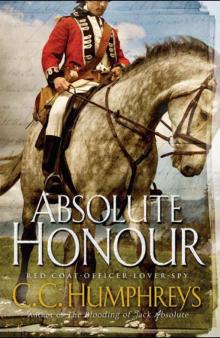 Absolute Honour
Absolute Honour Plague
Plague Blood Ties
Blood Ties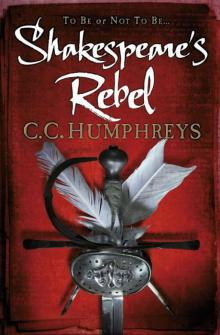 Shakespeare's Rebel
Shakespeare's Rebel A Place Called Armageddon
A Place Called Armageddon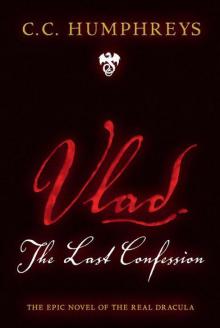 Vlad: The Last Confession
Vlad: The Last Confession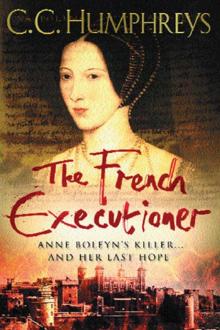 The French Executioner
The French Executioner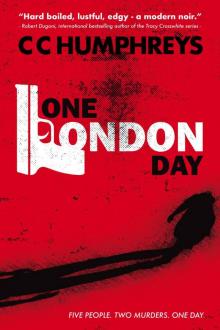 One London Day
One London Day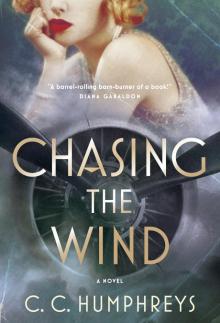 Chasing the Wind
Chasing the Wind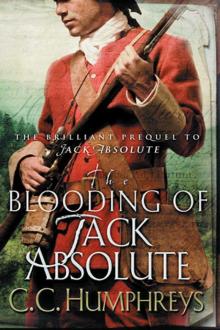 The Blooding of Jack Absolute
The Blooding of Jack Absolute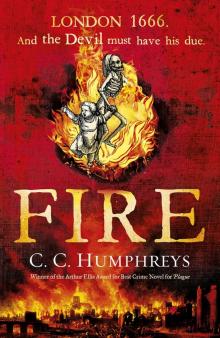 Fire
Fire